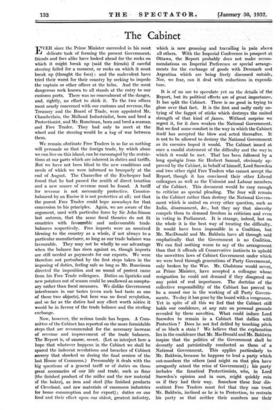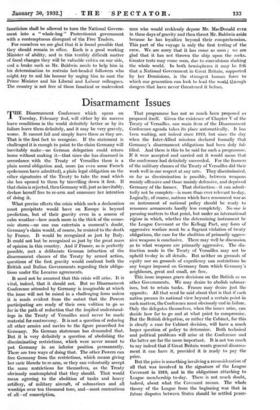The Cabinet
EVER since the Prime Minister succeeded in his most delicate -task of forming the present Government, friends and foes alike have looked ahead for the rocks on which it might break up (said the friends) if careful steering failed for a moment, or rocks on which it must break up (thought the foes) : and the malevolent have tried their worst for their country by seeking to impede the captain or other officer at the helm. And the most dangerous rock known to all stands at the entry to our customs ports. There was no concealment of the danger, and, rightly, no effort to shirk it. To the two offices most nearly concerned with our customs and revenue, the Treasury and the Board of Trade, were appointed Mr. Chamberlain, the Midland Industrialist, born and bred a Protectionist, and Mr. Runciman, born and bred a seaman and Free Trader. They had only to meet at the wheel and the steering would be a tug of war between them.
We remain obstinate Free Traders in so far as nothing will persuade us that the foreign trade, by which alone we can live on this island, can be encouraged by the restric- tions at our ports which are inherent in duties and tariffs. But we have not been blind to the new conditions and needs of which we were informed so brusquely at the end of August. The Chancellor of the Exchequer had found that he had passed the zenith of direct taxation and 'a new source of revenue must be found. A tariff for revenue is not necessarily protective. Counter- balanced by an Excise it is not protective at all; not that the purest Free Trader could hope nowadays for that concession to his principles. Again, we are aware of the argument, used with particular force by Sir John Simon last autumn, that the same fiscal theories do not fit countries with favourable and unfavourable trade balances respectively. Free imports were an unmixed blessing to the country as a whole, if not always to a particular manufacturer, so long as our trade balance was favourable. They may not be wholly to our advantage when the balance has risen against us, though imports are still needed as payments for our exports. We were therefore not perturbed by the first steps taken in the imposing of duties, feeling safe so long as Mr. Runciman directed the imposition and no sound of protest came from his Free Trade colleagues. Duties on lipsticks and new potatoes out of season could be swallowed as sumptu- ary rather than fiscal measures. We dislike Government interference in our tastes (even such bad taste as one of those two objects), but here was no fiscal revolution, and so far as the duties had any effect worth notice it would be in favour of the trade balance and the sterling exchange.
Now, however, the serious tussle has begun. A Corn. mittee of the Cabinet has reported on the more formidable steps that are recommended for the necessary increase of revenue and improvement of the trade balances. The Report is, of course, secret. (Let us interject here a hope that whatever happens in the Cabinet we shall be spared the indecent revelations and breaches of Cabinet secrecy that shocked us during the final session of the' last House of Commons.) Presumably it deals with the big questions of a general tariff or of duties on those great necessaries of our life and trade, such as flour (the finished product of the miller and the raw material of the baker), as iron and steel (the finished products of Cleveland, and raw materials of enormous industries for home consumption and for export) ; duties on our food and their effect upon our oldest, greatest industry. which is now groaning and travailing in pain above all others. With the Imperial Conference in prospect at Ottawa, the Report probably does not make recom- mendations on Imperial Preference or special arrange- ments for the exchange of goods with Denmark and Argentina which are being freely discussed outside. Nor, we fear, can it deal with reductions in expendi- ture.
It is of no use to speculate yet on the details 'of the Report, but its political effects are of great importance. It has split the Cabinet. There is no good in trying to gloze over that fact. It is the first and sadly early un- tying of the faggot of sticks which destroys the united strength of that kind of fasces. Without surprise we regret it, for it does weaken the National Government. But we find some comfort in the way in which the Cabinet itself has accepted the blow and acted thereafter. It is not to be allowed to destroy the National Government as its enemies hoped it would. The Cabinet issued at once a candid statement of the difficulty and the way in which it would be met. Thai has been followed by a long apologia from Sir Herbert Samuel, obviously ap- proved by the Cabinet, in behalf of himself, Lord Snowden and two other rigid Free Traders who cannot accept the Report, though it has convinced their other Liberal colleagues as well as the Unionist and Labour members of the Cabinet. This document would be easy enough to criticize as special pleading. The four will remain in the Cabinet rather than destroy the National Govern- ment which is united on every other question, such as India, disarmament, &e., but they say that sincerity compels them to demand freedom in criticism and even in voting in Parliament. It is strange, indeed, but on the whole it is the best way of treating the difficulty. It would have been impossible in a Coalition, but Mr. MacDonald and Mr. Baldwin have all through said emphatically that the Government is no Coalition. We can find nothing worse to say of the arrangement than that it offends all Conservative instincts to uphold the unwritten laws of Cabinet Government under which we were bred through generations of Party Government, only broken by the War. Mr. Gladstone would never, as Prime Minister, have accepted a colleague whose resignation he could not demand if they disagreed on any point of real importance. The doctrine of the collective responsibility of the Cabinet has proved to be a sound one in the working of all Party Govern- ments. To-day it has gone by the board with a vengeance. Yet in spite of all this we feel that the Cabinet still holds our confidence, at any rate on personal grounds revealed by these novelties. What could induce Lord Snowden to remain in a Cabinet that dallies with Protection ? Does he not feel defiled by touching pitch of so black a stain ? We believe that the explanation lies in the confidence that Mr. MacDonald and Mr. Baldwin inspire that the politics of the Government shall be decently and patriotically conducted as those of a National Government. This applies particularly to Mr. Baldwin, because he happens to lead a party which out-numbers the others (and might on that plea have arrogantly seized the reins of Government) his party includes the fanatical Protectionists, who, in Lord Snowden's opinion and in ours, might quickly ruin us if they had their way. Somehow these four dis- sentient Free Traders must feel that they can trust Mr. Baldwin, inclined as he is to Protection, to restrain his party so that neither their numbers nor their
fanaticism shall be allowed to turn the National Govern- ment into a " whole-hog " Protectionist government with a contemptuous disregard of the Free Traders.
For ourselves we are glad. that it is found possible that they should remain in office. Each is a good working Minister of ability, and in this terribly difficult matter of fiscal changes they will be valuable critics on oar side, and, a brake such as Mr. Baldwin needs to help him in his determination to restrain hot-headed followers who might .try to soil his -honour by urging him to oust the Prime Minister and his Liberal and Labour colleagues. The country is not free of those fanatical or malevolent
men who would recklessly depose Mr. MacDonald even in these days of gravity and then thrust Mr. Baldwin aside because he has loyalties beyond their comprehension. This part of the voyage, is only the first testing of the crew. We are sorry that it has come so soon ; we are glad that it has not thrown the ship upon the rocks. Greater tests may come soon, due to convulsions shaking the whole world. In both hemispheres it may be felt that a National Government in Great Britain, supported by tier Dominions, is the strongest human force to which our generation can look to lead the world through dangers that have never threatened it before.





































 Previous page
Previous page